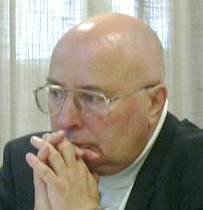Planning worship?
Check out our sister site, ZeteoSearch.org,
for 20+ additional resources related to your search.
- |
User Links
Person Results
Christoph Johannes Riggenbach
1818 - 1890 Author of "Danket Gott, denn er ist gut" in Antwort Finden in alten und neuen Liedern, in Worten zum Nachdenken und Beten
Christoph Johannes Riggenbach
Albrecht Kronenberger

b. 1940 Author of "Dia vort', el Dia sfer'" in TTT-Himnaro Cigneta Albrecht Kronenberger, born January 21, 1940, in Würzburg, Germany, was one of the three editors of ADORU - Ekumena Diserva Libro. As a youth, lived in Pirmasens and Germersheim; studied philosophy and Catholic theology in Eichstätt (Bavaria), Frankfurt (Hesse), and Speyer, where he was ordained a priest in 1966. After serving as vicar in Frankenthal and Bellheim, he worked from 1969 to 2002 as a Gymnasium (secondary school) teacher of religion in Neustadt an der Weinstraße, where he has remained in his retirement.
Not long after learning Esperanto in the late 1980s, he began to be active in teaching Esperanto in his school and in celebrating Esperanto-language masses in connection with Esperanto conventions and in the cathedral of Speyer (every other month since 1991). In 1991 he also cofounded the Working Union of IKUE in the Speyer diocese, which was officially acknowledged and approved by the bishop.
Albrecht Kronenberger edited the 1,472-page ADORU together with Adolf Burkhardt and Bernhard Eichkorn. He typeset all its texts and music on his computer, as well as writing many texts and some melodies himself. The three editors were awarded the FAME Prize (a cultural prize of the city of Aalen and of the FAME Foundation) in 2002.
In the first few years of the third millennium, Kronenberger edited the new edition of the Esperanto Bible, which appeared in 2006. Beginning in 2007, he put all of the hymns of the Latin Breviary, many of them his own translations, into Vikifonto (the Esperanto version of WikiSource). He initiated and arranged "Kantoj post ADORU", a hymnal supplement published as a special issue (No. 1-3/2009) of Espero Katolika. Since 2009, in collaboration with Marius Gibbels, he has been working on a project (Projekt Deutsch-Esperanto) that aims to produce a truly complete online German-Esperanto dictionary.
The German-language church songbook "Gotteslob" contains one of Albrecht Kronenberger's compositions, a Gloria (#455).
(main source: Esperanto Wikipedia)
Albrecht Kronenberger
Christian Gottlob Barth
1799 - 1862 Author of "Volk des Herrn, erhebe dich" in Gesangbuch der Evangelisch-reformierten Kirchen der deutschsprachigen Schweiz Barth, Christian Gottlob, son of C. F. Barth, house painter in Stuttgart, was born at Stuttgart, July 31,1799. He studied at Tubingen, where he was the principal founder of the Missionary Society, and was only restrained by his mother's entreaties from offering himself as a missionary. He became, in 1821, assistant at Neckarweihingen and Dornham, and, in 1822, curate in charge of Effringen and Schönbrunn, near Nagold. In 1824 he was appointed pastor of Möttlingen, near Calw, but resigned his charge in 1838, and settled in Calw, receiving in the same year the degree of D.D. from the University.of Greifswald. He died at Calw of apoplexy, Nov. 12, 1862. At Calw he devoted himself as a writer and preacher to children, as a preacher and writer in the cause of missions to the heathen and to the Jews, and as the founder and director of the Tract Society of Calw. One of his books, the Bible History, reached its 160th edition in 1872, and had then been translated into 24 European, 18 Asiatic, 7 African, and 3 South Sea languages. He frequently attended the meetings of the Religious Tract Society of London, and was a member of the Evangelical Alliance (Koch, vii. 199-210; Allgemeine Deutsche Biographie, ii. 94-95). Of his hymns there have been translated into English:—
i. Auf einem Berg ein Baumlein stand. [Holy Scripture]. Included in his Lieder und Gedichte fur Christenkinder, Calw, 1842, p. 83, in 4 stanzas. Previously in J. Köbner's Christl. Harfentöne, Hamburg, 1840, p. 115. The translations are:—
(1) "Upon a hill there stands a tree," by Dr. H. Mills, 1845 (1856, p. 25), and thence in P. Stow's Ocean Melodies, Boston, U.S., 1849. (2) "A tree grows on a mountain," by Mrs. Bevan, 1859, p. 138. (3) "A tree stood on a mountain," in Dr. H. W. Dulcken's Golden Harp, 1864, p. 22. (4) " On a hill stands a beautiful tree," in W. B. Bradbury's Fresh Laurels, N. Y., 1867, p. 15, signed "L. W." (5) " Lo, on a mount a tree doth stand," by Mrs. H. K. Spaeth, as No. 60 in the Pennsylvania Lutheran Little Children's Book, Philadelphia, 1885.
ii. Erhebe dich, du Volk des Herrn. [Missions.] Written for the Basel Mission Festival, June 12, 1833, In his Christliche Gedichte, Stuttgart, 1836, p. 18, in 8 stanzas. Translated as “Ye people of the Lord, arise!" by Dr. H. Mills, 1856, p. 202.
iii. Hütter, ist die Nacht verschwtinden. [Missions.] Written for the 20th anniversary, June 27,1835, of the Basel Missionary Society, and first published in the Mission Magazine for that year. In his Christliche Gedichte, Stuttgart, 1836, p. 54, in 8 stanzas. The translations are:—
(1) "Ho! watchman, is the night away," by Dr. G. Walker, 1860, p. 84. (2) "Watchman! Hath the night departed," in L. Rehfuess's Church at Sea, 1868, p. 107. [Rev. James Mearns, M.A.]
-- John Julian, Dictionary of Hymnology (1907)
Christian Gottlob Barth
Pierre Davantes
1550 - 1650 Person Name: Pierre Davantès Composer of "[Danket Gott, denn er ist gut]" in Antwort Finden in alten und neuen Liedern, in Worten zum Nachdenken und Beten
Pierre Davantes


 My Starred Hymns
My Starred Hymns


